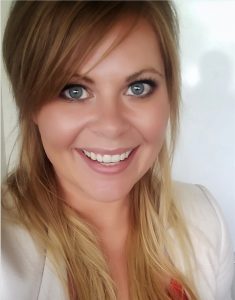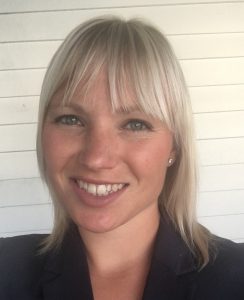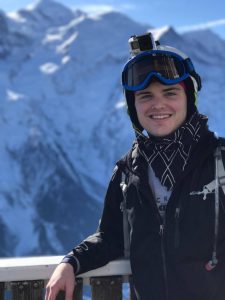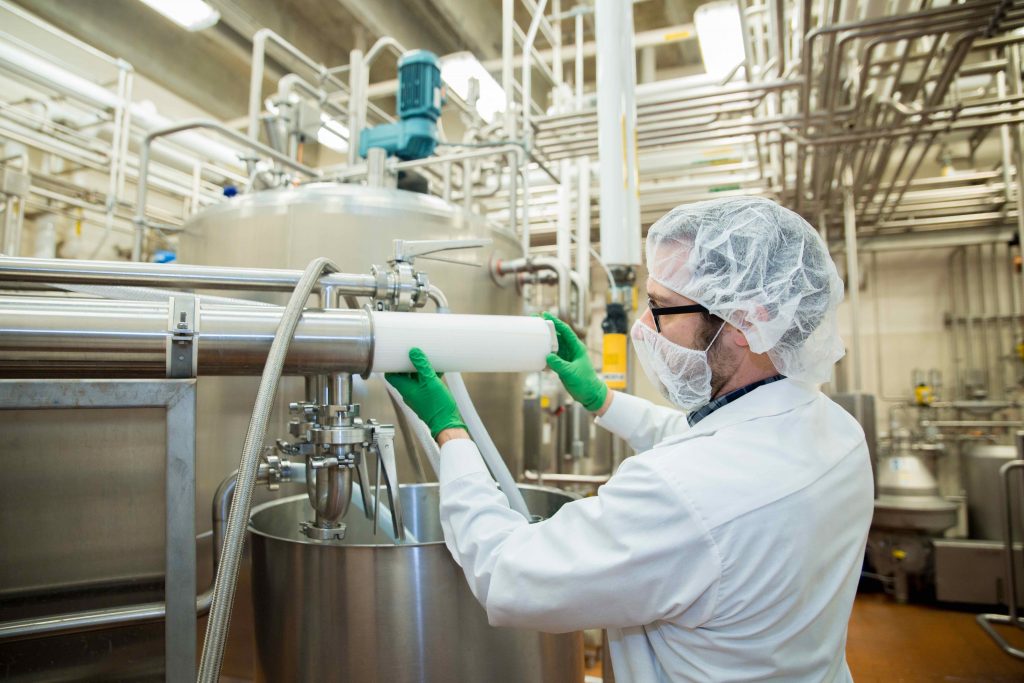 Meghan Estochen ’08 graduated from Hope College with a Bachelor of Science degree in engineering with a concentration in chemical engineering. After graduation, she worked for two years as a materials engineer specializing in adhesives for a Rochester, New York based company that made optical units for satellites. Meghan then moved to Albuquerque, NM to take a Manufacturing Engineering position with SolAero Technologies, which specializes in making solar cells and solar panels for space applications. In her time at SolAero Technologies Meghan has held positions of increasing responsibility including Configuration Manager, which over time expanded to include managing the Drafting team, and the Manufacturing and Test Engineering Manager for the solar panel product line. Currently, she is the Manager of Continuous Improvement, working with the entire organization to make strategic, Lean driven improvements.
Meghan Estochen ’08 graduated from Hope College with a Bachelor of Science degree in engineering with a concentration in chemical engineering. After graduation, she worked for two years as a materials engineer specializing in adhesives for a Rochester, New York based company that made optical units for satellites. Meghan then moved to Albuquerque, NM to take a Manufacturing Engineering position with SolAero Technologies, which specializes in making solar cells and solar panels for space applications. In her time at SolAero Technologies Meghan has held positions of increasing responsibility including Configuration Manager, which over time expanded to include managing the Drafting team, and the Manufacturing and Test Engineering Manager for the solar panel product line. Currently, she is the Manager of Continuous Improvement, working with the entire organization to make strategic, Lean driven improvements.
As the Manager of Continuous Improvement Meghan seeks to challenge the status quo every day. Her job is to ask “why?” and “what can we do better?” and then guide teams of hardworking, dedicated individuals to achieve great improvements. She teaches critical thinking, implementation of solutions, and how to always search for better ways to do things. This is applied in all areas of the business: production, engineering, supply chain, finance, corporate, etc. The primary tools used to generate improvement are derived from Lean Six Sigma, Toyota Manufacturing, and others methodologies that believe the strength of the business is in the creativity of its people and its willingness to constantly change to remain an industry leader. She also operates as a special projects manager using Scrum methodology for system implementation efforts and is a champion of corporate culture. She is grateful for and passionate about her incredibly unique role within SolAero. The following are excerpts from a recent correspondence with Meghan.
What do you find most exciting or interesting about the work that you do?
The work that I do ties directly to the mission of the organization and the programs it supports, and that motivates me every day. The first project I worked on was the solar panel array that took the Mars Science Lab to Mars. Our company powers satellites that provide early warning for natural disasters, satellites that provide entertainment like Sirius Radio, satellites that explore deep space. We will be powering the closest exploration of the sun with a satellite that will travel at 125 miles/second. We will be powering satellites that will give internet access to the world, starting with schools in third world countries. More than 40% of the power in orbit today came from SolAero Technologies. The impact of my work is vast and meaningful. It is a privilege to be a part of something so exciting.
What are some activities you were involved with at Hope that helped shape you as a person?
During my time at Hope, my technical degree was balanced with my Greek Life involvement. My senior year marked a significant ramp up in my leadership roles in Greek Life. I was the president of the Dorian Sorority, VP of the PanHellenic Council, and started the Greek Women: Making the Ideal Real initiative. I would not have been able to be so active and push for so much positive change during that year though, had it not been for the friendship with and mentoring from Ellen Awad. Her commitment to my development as a leader taught me what meaningful mentoring should look like and it has been something I have continued to leverage in my professional career, both as someone who always looks to improve and as someone now positioned to mentor others. I cannot say enough about how Ellen helped prepare me for a blossoming and fast-tracked career, maybe without even knowing it. Seeking mentors who are willing to invest time in your development and give you honest feedback is what will inevitably help anyone advance to where they want to be.
What aspect of your engineering education was most helpful?
Engineering design is the course that I have been able to apply most in my career. It included elements of design, experimentation, prototyping, and project management. It allowed for creativity, while teaching project management skills. It also provided an avenue for large public speaking forums. Today, I find myself delivering presentations to the entire 300-person organization very comfortably, and I know that started at Hope with the opportunities to present to other students, faculty, and community members.
Can you comment on the liberal arts aspect of Hope?
There is a joke often made that engineers are a socially awkward breed. And I believe I can geek out with the best of them! But often when this joke is made around me, people tack on “…but not you, we know you are an engineer, but you are an exception to the socially awkward rule.” This always makes me laugh. I believe that this is what a liberal arts education does for those who might naturally tend towards one very technical avenue. It makes us well rounded, relatable people, capable of integrating into a business world filled with many types of people. This will only help a career in an increasingly globalized market.
What advice would you give to current students?
Get involved. Don’t be afraid to take chances and take leadership roles. Push yourself academically and in your extracurricular activities. Value each experience for what you can learn from it and how it will shape you. You will one day look back fondly and be able to see how your Hope experience has made you into the success you are guaranteed to be. And if your career path is anything like mine, where you end up will be wildly different from what you anticipated.


 Johanna (Forst) Varga ‘13 is currently a Channel Marketing Manager for Cardiovascular Diagnostics & Services in Western Europe at Medtronic, a major medical technology and services corporation. Jo graduated from Hope College with a Bachelor of Science degree in engineering with a concentration in biomedical engineering. After graduation, she attended the University of Rochester where she obtained a Master of Science degree in biomedical engineering with an emphasis in neuroscience. Her first position at Medtronic was in the neuro modulation division, which focuses on the development of implantable stimulators for restorative medical therapies. Restorative medical therapies can include, for example, deep brain stimulation to treat patients with Parkinson’s disease. This interview was conducted after she had transitioned to an Associate Market Development Manager role within the Cardiovascular Division while she was working in the metropolitan area of Minneapolis, MN. In that role, she was called upon for marketing analytics where she used her research and technical background.
Johanna (Forst) Varga ‘13 is currently a Channel Marketing Manager for Cardiovascular Diagnostics & Services in Western Europe at Medtronic, a major medical technology and services corporation. Jo graduated from Hope College with a Bachelor of Science degree in engineering with a concentration in biomedical engineering. After graduation, she attended the University of Rochester where she obtained a Master of Science degree in biomedical engineering with an emphasis in neuroscience. Her first position at Medtronic was in the neuro modulation division, which focuses on the development of implantable stimulators for restorative medical therapies. Restorative medical therapies can include, for example, deep brain stimulation to treat patients with Parkinson’s disease. This interview was conducted after she had transitioned to an Associate Market Development Manager role within the Cardiovascular Division while she was working in the metropolitan area of Minneapolis, MN. In that role, she was called upon for marketing analytics where she used her research and technical background.
